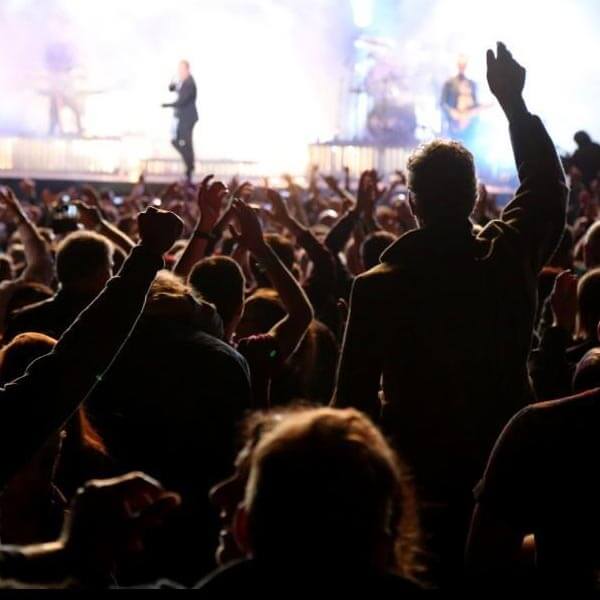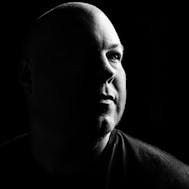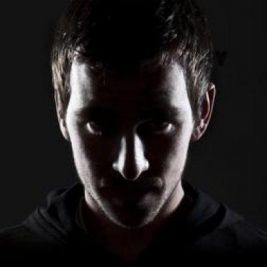
Alan Fitzpatrick interview: We Are The Rave
Marko Kutlesa caught up with the techno don to talk mix tapes, women in music and his love for Prince.
Skiddle Staff
Last updated: 19th Jul 2017
Image: Alan Fitzpatrick (credit)
Alan Fitzpatrick is one of the UK's biggest techno successes of the last decade. He started his career as a DJ in the early 00s and issued his first productions on his own label 8 Sided Dice in 2008. He soon caught the attention of some of the world's premier techno authorities, including Adam Beyer, who signed him to the long established Drumcode imprint.
The relationship between Fitzpatrick and Drumcode has been mutually beneficial; Fitzpatrick produced the label's first ever album in 2010's Shadows In The Dark and helped widen the label's remit from high quality, harsh looped techno to more song based material with drops, vocal hooks and a larger lean towards melody. Drumcode's reputation and releases have increased as a result and Fitzpatrick has entered the top flight of techno DJs thanks to the exposure the association has afforded.
Fitzpatrick mixed Fabric 87 in 2016, can often be found producing in collaboration with Dave Robertson aka Reset Robot, either as a partnership or as Customer, and has recorded for other labels such as Cocoon, Bedrock, Last Night On Earth and Hotflush.
He continues to develop a strong relationship with Drumcode, releasing the single 'Brian's Proper Dun One' on the label, although he also runs two newer labels of his own - Whistleblower Records, and the more recently established We Are The Brave.
Prior to a busy summer of dates that includes a Lost In Ibiza boat party, DC10, regular We Are The Brave sessions at Do Not Sleep at Sankeys Ibiza, Elrow Ibiza at Amnesia and a massive Drumcode event at Ebrington Square in Derry on Sunday 27th August, Marko Kutlesa caught up with the techno star to talk about the genre, labels, rave music, mixtapes and Prince.
When you play I often hear references to an earlier era of dance music, sometimes it will be a synth line that reminds me of rave or a loop of a screamed or shouted vocal. Those elements, along with a rave breakbeat, can also be heard in your most recent single 'You Got Me'.
It's not unusual for dance music DJs to reference old music, they do it all the time, but I really don't hear so many techno DJs doing it, not in the way you do. Is there something about the music or the era you're referencing that is particularly special to you?
Yeah, pretty much. That sort of sound is what I grew up listening to, when I first started buying records, listening to mixtapes and tape packs, it was all that early 1990s stuff that people now refer to as old school rave as well as some of the hardcore stuff that was leading into drum n' bass.
In recent years I've been revisiting that a lot, it resonates with me again. There's a lot of kids who come to my shows, the demographic of my audience has got younger and younger over recent years and a lot of them have never heard that stuff out live. So, I have been referencing it quite a bit. It's fun for me too. It reminds me of my youth, keeps me fresh.
You mentioned mixtapes. I know you used to collect them, what's your favourite mixtape of all time?
I've got quite a few. One that sticks in my mind is a DJ Slipmatt mix from Fantazia, New Year's Eve, 1993, I think. I picked that up a couple of years after it had been recorded and I've got very fond memories of listening to that, as a kid. It's got some of the very first plays of things like Baby D 'Let Me Be Your Fantasy' on it.
Mixes like that I used to listen to at school, on my headphones, while I should have been doing work. Things like that really planted the seed for me.
Thirty years after it first appeared is techno still futuristic music?
I would say so. I think nowadays it's difficult to call one specific genre of dance music futuristic, because of the improvements in technology, in the way that anyone can pick up a laptop, get a version of some software and start making music.
That in itself is quite a futuristic way of doing things compared to when you were younger, when you might have saved for two years to buy a synth because they were insanely expensive. Now you can get a ROM that operates in the same way for next to nothing. So the whole concept of music making is quite futuristic now.
But, in terms of techno, I still think it's at the forefront of pushing new sounds, new ideas, trying stuff that isn't necessarily sticking to a formulaic pattern.
Drumcode was already a very well established label when you joined the fold and in the time since you did so, both the label and yourself have grown in stature. Given that shared success, what is it necessary for an artist to do in order to not be defined by the label on which such productive collaborations occur?
That's a difficult one really. Cause I still think that, even though I've got my We Are The Brave thing and I've done lots of other stuff with lots of different labels whether it be Hotflush, Bedrock, Cocoon and other big brands, I think you're always partly linked in with your biggest accolade, your biggest relationship. Obviously mine's Drumcode.
But I don't think that's a bad thing, as you say we've grown together. Drumcode must be on 180 releases now. My first one was Drumcode 56. It already had a lot of releases before I came into the scene, but the sound was very different before then. I sort of sculpted that Drumcode sound in terms of big drops or vocal hooks and ravey stabs.
Now it's very much the norm to hear that on Drumcode, but when I started I was the first one doing that. So, I feel quite proud that the sound that Drumcode has now, the stature and size of the label now, I've had a big part to play in that. It's quite a big thing really. If I ever moved away from the label it would be nice to see that that's something you helped create.
Do you think it's easier to get lost in the endless possibilities of modern studio equipment than in a previous era when working under the restrictions of the limits of the equipment then available?
Yeah, definitely. I still say that. I do some guest lectures at Southampton University on music production, industry advice, do's and don'ts and this comes up quite a lot. People are kind of bamboozled by the amount of stuff there is to use now, whereas back in the day you might have had a 909 and a half decent synth and you could make tracks.
My advice now would be to find the software that you click with the most and just use that. Don't complicate it with using too much other stuff. It's very hard to find a sound if you're using too much different equipment all the time because it's always going to sound different.
Also, it's hard to get your mixdowns right because you're always using stuff that's unfamiliar. My advice is to learn a piece of software you like and stick with it so you get the best out of it. I've used Reason since day one, I've never used anything else and I probably never will. You can introduce new stuff once you've got to know a program really well, but to pollute it too much is dangerous.
My advice is to learn a piece of software you like and stick with it so you get the best out of it. I've used Reason since day one, I've never used anything else and I probably never will. You can introduce new stuff once you've got to know a program really well, but to pollute it too much is dangerous.
These are the tools a DJ uses to provoke dancing and an emotional response from their audience; rhythm, percussion, basslines, melody, your skills as a selector, mixer and as a sound manipulator. That's not so many tools. In your opinion, which of these tools are most underused in techno?
I think sometimes people can get caught out not being the best selectors, I don't think it's healthy to think you just want to be playing promos, the newest things that come into your inbox. I see that a lot on the road, people thinking that this track's already been released so I'm not going to play it.
We can all do that, as DJs, we get a lot of stuff sent to us for nothing, you listen to it, you like it, you play it. But I still think the selection and the culture of teaching a sound to people is important. You need to be comfortable playing a track that is 20 years old as much as one that's not out yet. I think if you choose to only play what you think is the forefront of the sound now, that's when the education part gets lost. Some of the best tracks are older tracks. So, selection can be lacking in some areas of the scene.
While I don't disagree with you, I would have said melody. I think a lot of new techno DJs are either scared of or just not used to using melody.
I probably didn't choose that one myself because I use loads of melody!
You do. But it's not something I hear a lot of other techno DJs do. If I think back to Rhythm Is Rhythm tracks and Juan Atkins....
I think you're right. There's probably a fair amount of people who are shy to use it in case someone classes it as a different genre. I get it a lot. One of my recent tracks on Drumcode has a bit of a tongue in cheek title with the word trance in it because I knew some people would hear it and say it was trance, not techno. So, the joke was in the title of the track. But you do get that, I'd agree. In some areas, people are afraid to get a melody going on the synths.
There are plenty of great electronic music tracks, EPs and singles. But I think it's very difficult to make a truly fantastic electronic music album. In your opinion, which artists have succeeded in doing so?
In terms of what I would regard as a perfect or a near on perfect album of electronic music? Aphex Twin's Selected Ambient Works is a great one. Goldie's Timeless album. Apollo, the Brian Eno album from the late 70s, one of the finest pieces of electronic music. Boards Of Canada have done some amazing stuff.
It's very hard to think of something I would class as near on perfect from recent times, but The Francis and the Lights album is really, really good.
You're a big fan of Prince. Which tracks of his have you been able to play out in tribute to him since his sad passing?
'Controversy', '1999', 'When Doves Cry', 'Erotic City'. I have two portraits of Prince on my right calf. Most of the bottom half of my leg is Prince portraits, done by a fairly famous portrait artist. The guy's a legend. I'm planning on getting Bowie on the other leg, he's another one of my heroes.
You usually issue a few releases every year on Whistleblower but here we are in the sixth month and so far in 2017 the label's not had anything out. What's with that?
We've been signing stuff up. Actually, we've just promoted the next release which is me and Dave (Robertson, Reset Robot) as Customer. That's got a Deetron remix and is probably out in the next couple of weeks.
We've just been quite busy. I've been working on stuff, Dave's been busy in the studio and getting busier as a DJ. His Reset Robot stuff's really taken off. So, it's just a timing thing, that's all it's down to really.
I would like to ask a question prompted by one of the big news stories in dance music media in the last few weeks. Must women assume some masculine qualities in order to have a career in a male dominated DJ industry?
No. I just think 'be good at what you do'. If you're good at what you do it shouldn't matter what sex, age, race you are. There are a lot of good female DJs out there. Up and coming female DJs should never be put off by any kind of negative messages that come out in the media. If you're good at something you should pursue it.
I'm a firm believer in willing something to happen in order to make it happen. I did see some stuff on social media about this, but I didn't see enough to actually read the comments it was all about. I'm a bit blind to that story. But, in terms of what I think, if you're good at it, crack on and do it, don't give a shit about anyone else.
Alongside his appearances in Ibiza, Alan Fitzpatrick tickets for Ebrington Square in Derry on Sunday 27th August are available below.
Tickets are no longer available for this event
Read more news

























